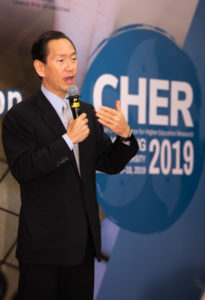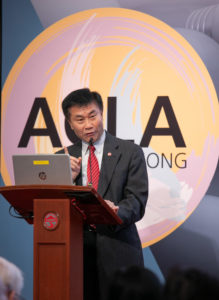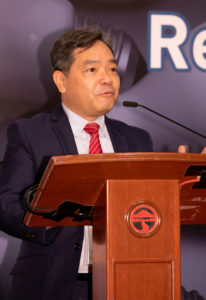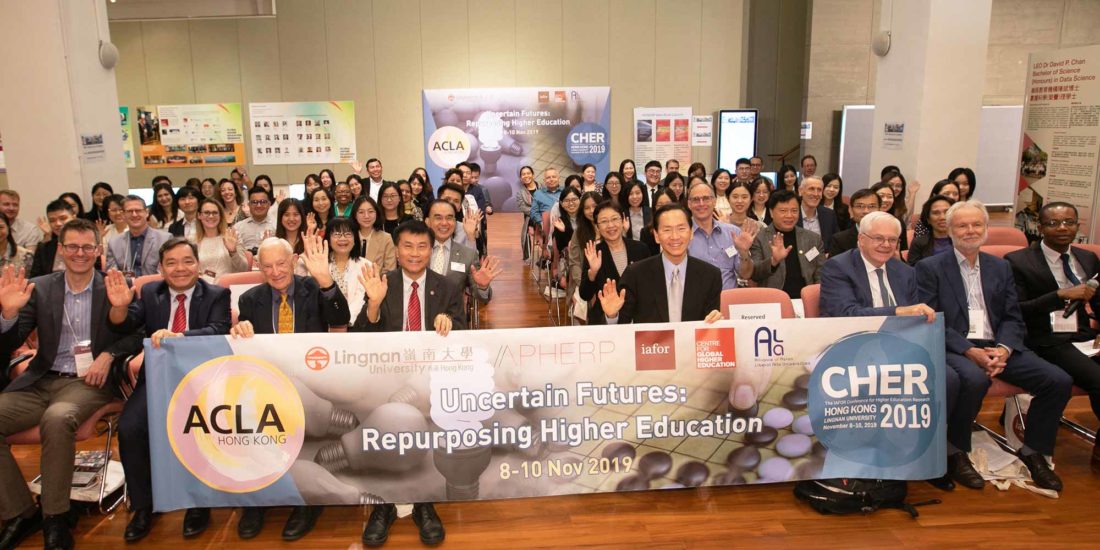Following the overwhelming success of last year’s edition, Lingnan University, The International Academic Forum (IAFOR), and the Asia Pacific Higher Education Research Partnership (APHERP) co-hosted The IAFOR Conference for Higher Education Research (CHER) 2019. The theme of CHER 2019 was "Uncertain Futures: Repurposing Higher Education", a title chosen to reflect the precarious nature of global socio-economic development today. The Asian Conference on the Liberal Arts (ACLA) 2019 was held alongside CHER, under the theme "Uncertain Futures: The Role of Liberal Arts Education".

Dr Bernard Charnwut Chan
The conferences were attended by researchers specialising in higher education, senior university administrators, government officials, policy analysts, and students. Attendees came together to explore how societies could limit the adverse aspects of the uncertainty that underlies the future. Around 120 speakers and over 80 postgraduate students attended from approximately 30 countries and regions. Participants came from Asia, Oceania, Europe, North and Central America, and Africa.
Keynote and featured speeches were given by Professor Leonard K. Cheng (President, Lingnan University), Professor Francis Green (University College of London, UK), Professor Simon Marginson (University of Oxford, UK), Professor Adam R. Nelson (University of Wisconsin-Madison, US), Professor Deane Neubauer (East-West Centre, US), and Professor Joshua Mok (Vice President, Lingnan University). Dr Bernard Charnwut Chan (Executive Council member of the Government of the Hong Kong SAR), gave the opening remarks. Dr Chan emphasised the need to establish strong ties between educational institutions and governments due to the uncertain socioeconomic futures faced by various societies around the globe.

Professor Leonard K. Cheng
In a speech titled Equal but Different: Global and Regional Implications of the Rise of China in Universities and Science, Professor Simon Marginson argued that the coming decades may witness a situation where rapid growth and improvements in China are impeded by geopolitical conflict. This could be the result of restrictions on both the mobility of people and technology exchange. But China’s systems of higher education and science are now sufficiently developed, and self-sufficient enough, to sustain a strong regional and global role under such conditions, he added. Professor Marginson also discussed the similarities and differences between universities in China and Euro-America, and the implications of the emerging bipolar world for the evolution of both global higher education and education in China.

Professor Joshua Mok
Speakers including Professor Joshua Mok furthered the discussions by offering theoretical and empirical perspectives to aid the understanding of the uncertain futures that are confronting societies. The speakers also discussed ways to confront problems by using new human resources methodologies.
Attendees deemed the conference a major success, and all participants said they were satisfied with the academic and social content of the programme. Organisers said they had achieved the goal of debating the higher education needs of the future, and establishing how to repurpose higher education for the coming uncertain times. Students, researchers, and policymakers all agreed that they must define the roles they will play to ensure a successful completion of the tasks that lie ahead.
This article was originally published on the Lingnan University website.
Keynote and Featured Talks
- Boya Education in China: Lessons from Liberal Arts Education in the US and Hong Kong – Professor Leonard K Cheng, Lingnan University, Hong Kong
- Equal but Different: Global and Regional Implications of the Rise of China in Universities and Science – Professor Simon Marginson, University of Oxford, UK
- Graduate Employment and Under-employment – Professor Francis Green, University College London, Institute of Education, UK
- Engaging the Forces Propelling the Repurposing of Higher Education – Professor Deane Neubauer, East-West Centre, USA
- Uncertain Futures of the Past: ‘Repurposing’ American Higher Education, 1945-1965 – Professor Adam R Nelson, University of Wisconsin-Madison, USA
- Questing for Sustainable Development in Higher Education: The Role of Liberal Arts Education – Professor Joshua Ka-ho Mok, Lingnan University, Hong Kong

